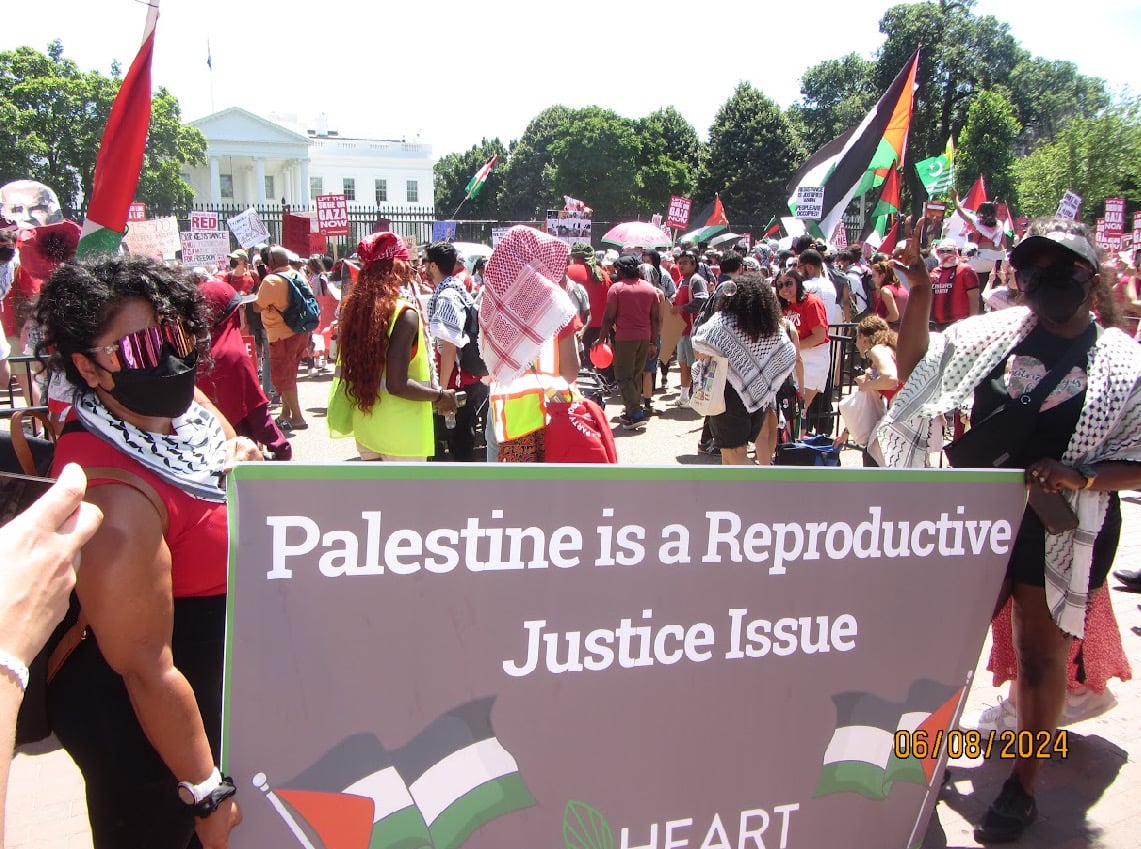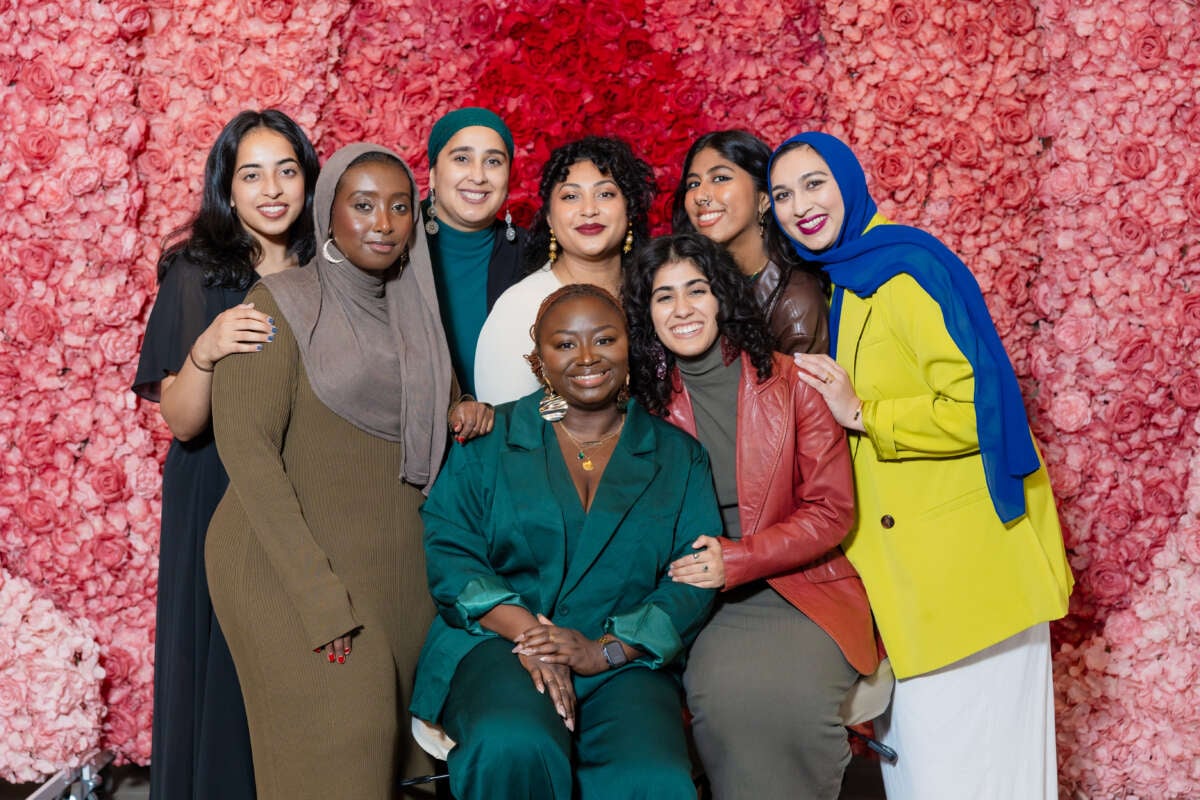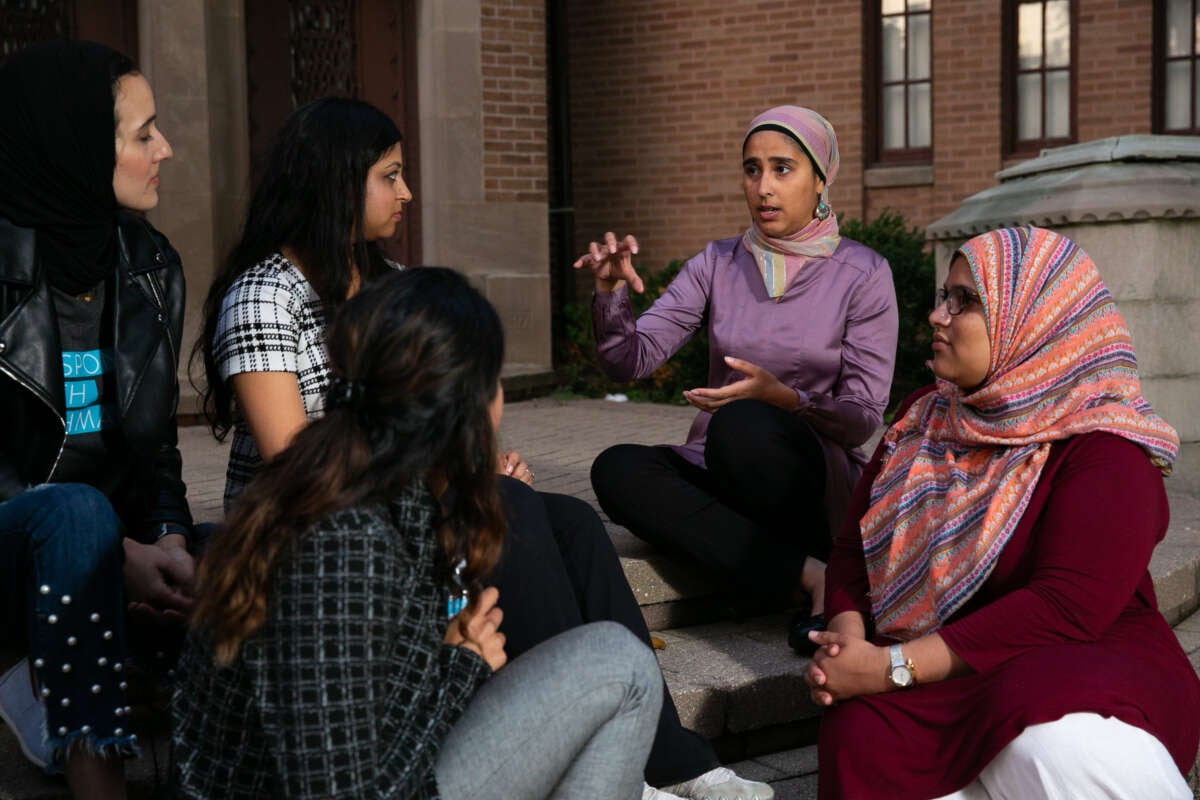On a family visit to Pakistan in 2000, Bursha Munifasa, then 23, discovered she was pregnant. She sat with her husband in their parked car after an ultrasound, staring at her medical report, unable to decipher what “pregnancy positive” meant. No one had said a word about pregnancy during her appointment.
“I was so naive,” she recalls, sitting in her home in the Chicago suburbs where she’s lived for over 20 years now. In retrospect, there were allusions. “When the ultrasound technician asked if I had any other children, I didn’t even understand why he was asking.”
In that parking lot in Karachi, Munifasa found herself making important decisions about reproductive health care while balancing multiple cultural contexts and sometimes opaque information sources, even amongst her medical providers.
She had recently graduated with an undergraduate degree in management and accounting. While navigating their first jobs, Munifasa and her husband were still finding their footing in the U.S. as recent immigrants far away from family and community support. Nonetheless, she chose to continue with her pregnancy, giving birth to her first daughter in Chicago.
“No one really tells you what a big responsibility [it] is. Once a child comes on, drastically, your life changes,” she said. “I think it’s a very serious topic to discuss and think about before having children, because you have to have community around you, because you do require a lot of physical, emotional, and mental, and spiritual counseling while you are going through pregnancy … and even after you have your children.”
Despite the importance, Munifasa’s experience navigating societal silence on reproductive health, including motherhood, is common. Many Muslim Americans struggle to find spaces for dialogue and to make informed decisions about their reproductive and sexual health — a need that the Muslim-led national organization Health, Education, Advocacy, Research and Training, or HEART, is working to fill with culturally resonant and honest information. As the country continues to wrestle over the legal landscape of reproductive rights, HEART hones in on nurturing reproductive justice by building safe environments for Muslims to have and raise children — or to make the informed decision not to.
A Dearth of Information
Founded in Chicago in 2009, HEART began as a volunteer-run initiative to provide education to the Muslim community about healthy relationships, consent and sex. Nadiah Mohajir and Ayesha Akhtar created the organization in direct response to the lack of support to Muslim people dealing with complex reproductive and sexual health experiences — both in mainstream reproductive movements and in Muslim institutions. This mission resonated with Muslim people around the globe — from Singapore to New York to Calgary — who came together over Skype and across time zones to create accessible educational materials for their local communities. Today, HEART is a national project with over 50 team members, attorneys, educators and scholars promoting sexual and reproductive health, and attempting to uproot gender-based violence in Muslim communities.
One of the first team members, Sahar Pirzada, HEART’s director of movement, has her own experiences navigating sexual issues, fertility, abortion and pregnancy in Muslim community spaces. Through it all, “Islam was always a part of how I made decisions about my body,” she said. As a community trainer with HEART for 15 years, Pirzada says many Muslims also look for these perspectives when making decisions about their reproductive life.
“They think about, okay, is this something that is permissible Islamically, or is it not? How am I going to navigate this experience knowing that I’m going to be accountable for whatever I do in front of God?” Pirzada said.
However, oftentimes Muslim people’s need for sexual health information goes unanswered. Pirzada said there isn’t accessible information about Islamic perspectives on these issues — whether online, in public or in private spaces. What is available rarely reflects the diversity of Islamic perspectives and lived experiences of Muslims.
HEART initially brought the questions they were hearing from the community to a range of doctors specializing in sexual reproductive health, academic scholars and traditionally trained Islamic scholars to capture a variety of opinions. There were many perspectives and historical texts to dig through. Pirzada cites the many stories in the Quran of people experiencing reproductive struggles, from physical problems such as infertility and birthing pains, to societal problems such as lacking adequate food for newborns during famines.
One of the results was a literature review pulled from multiple textual recommendations — a process that Pirzada said brought out more questions than answers, especially on more contemporary questions such as surrogacy and fertility treatments. But she felt it was a validating experience.
“Islam has always been diverse in terms of its interpretations,” said Pirzada. “We need more engagement with traditionally trained Islamic scholars … because the technology has advanced so much and the scholarship hasn’t always caught up.”
In 2024, HEART launched Reproductive Agency Honoring Impacted Muslims (RAHIM), a national campaign to connect individuals to this growing collection of information so they are able to take care of their own bodies, while considering their faith as an important part of their decision-making process. The organization chose the name RAHIM for its shared root with the Arabic words “Rahman” and “Rahim.”
“Those are two words that come up repeatedly in our scripture — compassion and mercy,” said Pirzada. The word “Rahim” also refers to the womb. She explained that it was important to choose a resonant word drawn from the Islamic tradition that conveyed their values as a reproductive justice movement made for Muslims and by Muslims. “If they are familiar with the faith, they would have probably heard these words Rahman and Rahim.”
Along With Advocacy Comes Service in Community
Beyond providing answers, HEART’s programming encourages Muslims to not be shy when asking questions about their reproductive lives.
Despite not having discussions about sex during her own upbringing, Munifasa initiated conversations about sexual health with her daughters, who were both born in the U.S. Her daughters received sex education classes at school, but she wanted to personally foster a dialogue with them about reproductive health, especially to answer questions they may have related to their religion and sex, which was not taught in the classroom. Munifasa’s daughters still poke fun at her about the sex education books she purchased for them, but she’s grateful for their openness.
Munifasa also cared deeply for her daughter’s long-term health and wellness.
“If you choose or not, choose not to have children, or you want to wait, just make sure the checkups are good … make sure things are in order for you,” she said.
Like Munifasa, HEART works to counter the culture of silence preventing open and informative conversations on sexual health. Muslim Americans face challenges in accessing culturally competent care for sexual health, which can prevent them from opening up about problems. According to RAHIM’s 2020 survey, among Muslim women respondents, 65 percent reported never seeking help for their pain from a health care provider — though 42 percent admitted to a history of sexual pain or other issues.
When Abdul Bhuiyan visited his family doctor in Miami at age 20, he hoped a medical setting would provide a safe space shielded from his community’s stigma against discussing sexual health. So, he asked the doctor a question about safe sex practices. But instead of a medical opinion, Abdul remembers receiving a dismissive response of “you shouldn’t do that” from the doctor along with a shameful look.
“As soon as I mentioned it, I felt that same wave of shame,” he said. “You know that kind of shame like I shouldn’t be sharing this anymore, I should keep this to myself.”
That experience pushed him to avoid reproductive and sexual health care for years.
Since then, Bhuiyan, now in his 30s, changed doctors and started seeing a therapist. But the hesitation to talk about sexual and reproductive challenges still lingers.
“It’s just like something that sits in the back of the head,” Bhuiyan said. “Even though I know like there’s no reason to really hold back information.”
HEART’s efforts to break the silence started with in-person workshops with Muslim women to talk about consent, sex and healthy relationships. Once space was created to have these conversations, the result showed just how harmful staying silent can be.
“[HEART] started to receive disclosures from the community about instances of everything ranging from intimate partner violence and sexual violence to also struggles people were having with their sexual and reproductive lives and health,” said Pirzada. Receiving this feedback pushed HEART to tailor their programming, including establishment of three mutual aid funds that support individuals navigating gender-based violence, and a referral network of trusted lawyers, chaplains and other direct service advocates.

Bringing an Islamic Perspective to Broader Coalitions for Reproductive Justice
Drawing on Islamic traditions of social justice, HEART joins a broader constellation of reproductive justice organizations led by women of color, such as SisterSong and Indigenous Women Rising. As communities historically marginalized and oppressed by state systems, these projects have developed frameworks of reproductive justice that decenter a legal rights approach.
The reproductive justice framework originated in 1994 in Chicago during a national pro-choice conference in response to then-President Bill Clinton’s proposed universal health care plan. There, in criticism, a caucus of Black women activists known as the Women of African Descent for Reproductive Justice first articulated “reproductive justice” by bringing together social justice and reproductive rights, especially to include the concerns of Black women.
Three years later in 1997, 16 organizations led by Indigenous and women of color founded the first organization to build such a reproductive justice movement — SisterSong Women of Color Reproductive Health Collective (now known simply as SisterSong) which remains today as the largest collective of its kind. Their definition of reproductive justice addressed both individual rights and collective conditions that disproportionately affect people of color: the right to maintain bodily autonomy, the right not to have children, the right to have children, and the right to raise children in safe and healthy environments.
Adopting SisterSong’s expansive definition of reproductive justice came naturally to HEART’s leadership.
“Reproductive justice as a framework really resonated with us because it went beyond just health care systems and laws,” Pirzada said. For many Muslim people, she explains, the right to abortion does not guarantee an environment where they can exercise full reproductive freedom.
While reproductive rights focus on legal access to services like abortion or contraception, reproductive justice asks broader questions: Can a Muslim woman wear a hijab to her gynecologist without facing discrimination? Can a single mom afford child care while attending these reproductive health appointments?
“You might have a law in place, but that doesn’t mean that you have language access to understand what the doctor is saying,” said Pirzada, emphasizing that economic security, anti-discrimination and family support systems are all essential for true reproductive autonomy.
While the original reproductive justice founders focused on issues like forced sterilization and lack of health care access, their emphasis on addressing systemic barriers rather than on legal rights alone created a blueprint that spoke to many marginalized communities, back then and today.
“[Muslims] are navigating surveillance, national security policies that target us as an enemy of the state,” Pirzada gave as an example. “Muslim bodies are criminalized and surveilled because of national security, gendered Islamophobia, which very deeply intersect with how Black and brown communities have all been surveilled and criminalized in this country,” Pirzada said.
The Muslim community HEART serves comprises one of the most racially and ethnically diverse religious groups in the U.S. U.S.-born Black Muslims account for 20 percent of all U.S. Muslims. A majority of U.S. Muslim adults — 58 percent — were born in another country and their children make up another 18 percent of U.S. Muslims. Among foreign-born Muslims, about a third were born in South Asia, a quarter from the Middle East and North Africa, and another quarter from other Asia/Pacific countries.
Pirzada believes that because Muslims are such a diverse community, HEART’s leadership has learned much from other groups with different approaches to the communities they’re serving, specifically how to build their own support systems beyond the state. For example, Indigenous Women Rising’s concept of “reproductive sovereignty” informed HEART’s multifaceted approach to mutual aid, which includes a reproductive justice fund that responds to the needs of Muslims across a lifespan.
“So it could be anything from they’re experiencing painful menstrual cycles to, you know, pregnancy care, abortion care or support with fertility treatments, or even menopause,” Pirzada said, adding that HEART’s funds have supported people by covering their direct medical costs like medication and insurance copay or deductible as well as covering child care, transportation and housing.
“We’re so appreciative and grateful to the many Black and Indigenous leaders in this country that have paved a foundation for us to look at that framework and then build off of it.”

A Locally and Globally Minded Movement
HEART’s advocacy extends far beyond national borders, demonstrating a commitment to global Muslim solidarity. In June 2024, HEART led a contingent of reproductive justice organizations during a march for Palestinian rights in Washington, D.C. This action underscored their stance that reproductive justice is inextricably linked to the right to raise children in a safe and healthy environment.
“I can’t as a Muslim person that wants to fight for reproductive justice also not call into question how my U.S. tax dollars are contributing to the extermination of Muslim bodies globally,” said Pirzada.
HEART spends much effort to help Muslims make the connection between their personal experience with broader, seemingly unrelated, political events. One recurring theme is tying the effects of Islamophobia to consequences felt by individuals and communities.
Over the past year since the start of Israel’s assault on Gaza, Pirzada led several healing circles for the Muslim community in which people grieve and process how witnessing genocide has impacted their sexual and reproductive lives — on top of existing struggles related to abortion, fertility and pregnancy.
“On the backdrop of this political landscape, it impacts us even more,” said Pirzada. Past research into gendered Islamophobia shows that state-driven Islamophobic narratives that Muslim women are “inherently” oppressed harm these women. Islamophobia’s internalized effects can look like women staying silent about gendered violence because it is seen as acceptable or normal.
At RAHIM’s virtual launch in November, co-founder Nadiah Mohajir addressed how even progressive voices sometimes repeat harmful stereotypes. When several states enacted abortion bans in May 2022, some commentators, including Daily Show host Trevor Noah, compared the restrictions to “Sharia law.”
Such comparisons not only erase the work of Muslim-led organizations like HEART that have long fought for reproductive justice, but also undermines the public from “understanding Islam as a liberatory and feminist faith that promotes sexual and reproductive well-being,” Mohajir explained.
Far from being incompatible with reproductive justice, Muslim communities and organizations have been integral to the movement.
“It’s actually been really beautiful how many Muslims we have come across,” Pirzada reflected. She noted that Muslim reproductive justice advocates reflect the community’s diversity — working in local organizations from Georgia to California, serving Asian American communities and specializing in niche aspects of reproductive health care.
And that’s exactly how Pirzada lives out her Islamic faith as a reproductive justice champion of a wide-spanning movement working to leave no one behind — whether they’re Muslim or not.
“There’s a beautiful history in our Islamic tradition of how God has constantly centered birthing people and shown care and validation of them,” Pirzada said.
“We need to maintain [that legacy] as Muslims today. What are the calls from birthing people in the United States today, or birthing-capable people in the United States today that we have neglected?”
Our most important fundraising appeal of the year
December is the most critical time of year for Truthout, because our nonprofit news is funded almost entirely by individual donations from readers like you. So before you navigate away, we ask that you take just a second to support Truthout with a tax-deductible donation.
This year is a little different. We are up against a far-reaching, wide-scale attack on press freedom coming from the Trump administration. 2025 was a year of frightening censorship, news industry corporate consolidation, and worsening financial conditions for progressive nonprofits across the board.
We can only resist Trump’s agenda by cultivating a strong base of support. The right-wing mediasphere is funded comfortably by billionaire owners and venture capitalist philanthropists. At Truthout, we have you.
We’ve set an ambitious target for our year-end campaign — a goal of $250,000 to keep up our fight against authoritarianism in 2026. Please take a meaningful action in this fight: make a one-time or monthly donation to Truthout before December 31. If you have the means, please dig deep.
